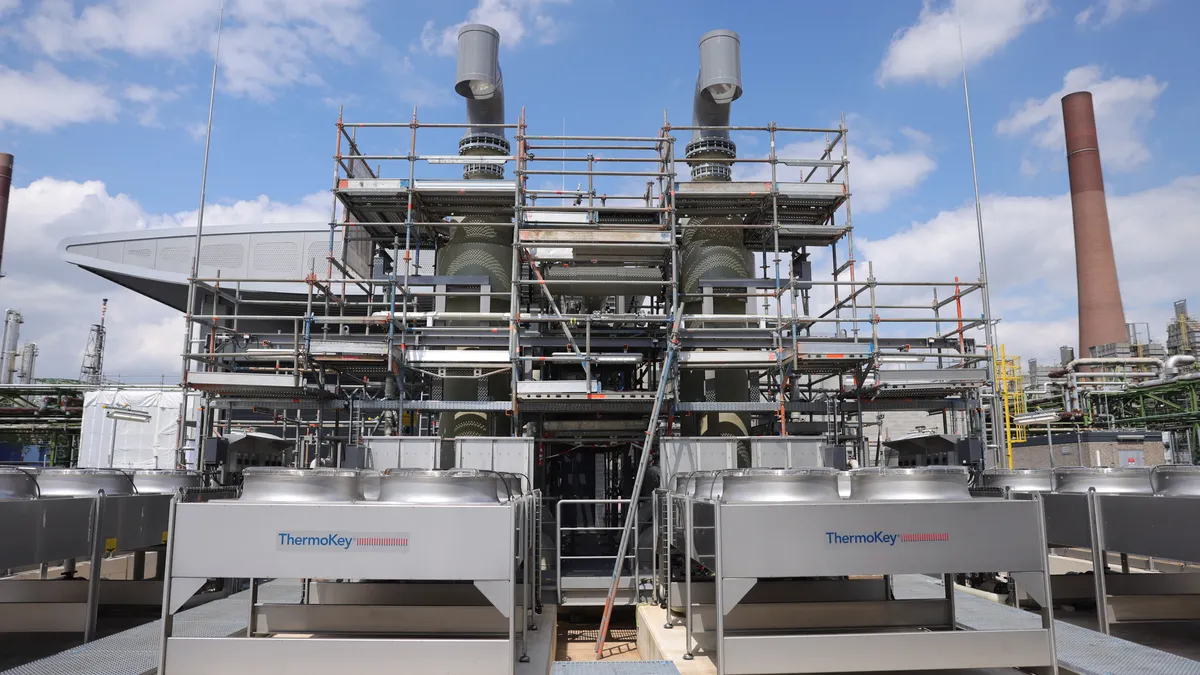Dive Brief:
-
A Thursday morning hearing before the Senate Committee on Energy and Natural Resources yielded a rare show of bipartisan agreement on the subject of supporting the deployment and adoption of hydrogen fuel in the U.S.
-
Senators from both parties expressed support for federal funding of hydrogen research and development, and potential hydrogen tax credits.
- In addition to questions about the logistics and current capabilities of hydrogen-based technologies, multiple senators touted the potential benefits to the U.S. if the Department of Energy were to locate one of four planned "hydrogen hubs" in their state.
Dive Insight:
When it comes to hydrogen, the only point of disagreement among Senate leaders seems to be where to make it.
Sen. Joe Manchin, D-West Virginia, chairman of the Senate Energy and Natural Resources Committee, opened Thursday's committee meeting by introducing hydrogen as a "game-changing fuel" and touted its potential to decarbonize the U.S. economy without increasing reliance on other countries or on limited supplies of rare minerals such as lithium.
"The future of hydrogen is exceptionally important for us to address," Sen. James Lankford, R-Oklahoma, agreed. "Hydrogen is one of the simplest and most commonly occurring elements on Earth.... NASA has been using hydrogen since the 1950s to power rockets. It's time to learn from their experience to solve heavy transportation on Earth."
Hydrogen could support as many as 700,000 new jobs in the U.S. by 2030, Sunita Satyalpal, director of the hydrogen and fuel cell technologies office within the U.S Department of Energy, told the committee. But she also cautioned that the U.S. is far behind Europe and Asia in the adoption of hydrogen — the European Union, for example, has set a goal to deploy 40 GW of electrolyser capacity by 2030.
"We must ramp up production," she said. "We must remain laser focused and accelerate progress."
Satyalpal highlighted the DOE's "hydrogen earthshot," an ongoing research program announced in June that aims to cut the cost of hydrogen by 80%. But while research funding is essential, research alone won't be enough to transition the U.S. to a hydrogen economy, said Jonathan Lewis, senior counsel and director of transportation decarbonization for the nonprofit Clean Air Task Force. Support for broader deployment, potentially through tax incentives already under consideration, is also necessary, he said.
Brian Hlavinka, Williams New Energy Ventures vice president, also called for incentives beyond research and development.
"We think we can do projects today, and we are doing projects today," Hlavinka said. "But we also know that to get to scale, we're going to need help and new partnerships."
The meeting's expert panel generally agreed that transportation, especially heavy shipping, chemicals manufacturing, and utilities were among the industries where hydrogen presents the greatest benefit. They also generally agreed that what is sometimes called "blue" hydrogen — hydrogen extracted from methane and coupled with carbon capture and sequestration to reduce emissions — would likely become commercially viable before "green" hydrogen, which is created by using renewable energy to power electrolysis to split water into hydrogen and oxygen.
"We need a lot of clean hydrogen quickly, and we need it to be cost-competitive, and making enough from any one resource is going to be difficult," Lewis said. "Our anticipation is that hydrogen made from natural gas with carbon capture and sequestration is significantly cheaper than electrolysis."
This led to a point of disagreement between parties on the committee, with Democrats raising questions about the potential to reduce the cost of electrolysis, while Republicans argued for the efficiencies represented by repositioning existing natural gas infrastructure. Committee leaders, however, urged their colleagues not to get overly focused on the hydrogen "colors."
"I am concerned the conversation around green versus blue hydrogen will prevent technologies from working together," Lankford said.
But with the committee quickly arriving at the conclusion they had bipartisan agreement on the need to fund hydrogen research and infrastructure, many senators moved straight from questioning to their next agenda—touting their own state's potential qualifications to host one of four "hydrogen hubs" the DOE is required to create per the Infrastructure Investment and Jobs Act.
"I have received two letters, actually, from our governor—one was directed to the chair—talking about Alaska's clean hydrogen potential," Sen. Lisa Murkowski, R-Alaska, said. "Is Alaska being considered?"
Senators from Arizona, Louisiana and, of course, Manchin from West Virginia all expressed interest in throwing a hat in the ring, as did Glen Murrell, who testified as the executive director of the Wyoming Energy Authority. The numerous contenders led Sen. Mark Kelly, D-Arizona, to end his comments with a final inquiry: would it be possible to fund more than four hydrogen hubs?













